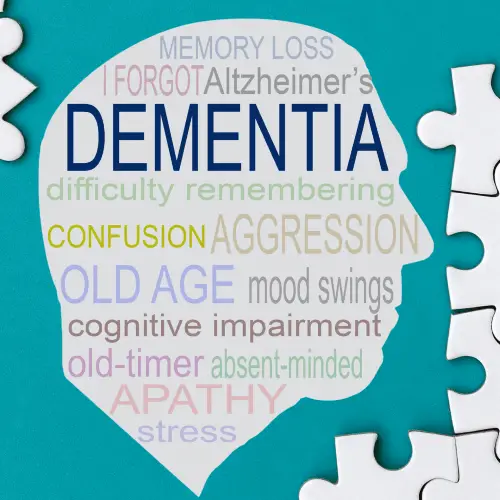Dementia is a broad term for memory loss or language, problem-solving skills, or other thinking abilities that are significant enough to affect the daily routine.
What is dementia?
The term “dementia” is used to describe a collection of signs and symptoms that impact memory as well as social and thinking abilities sufficiently to disrupt your day-to-day activities. There isn’t any specific illness, however, several illnesses can trigger dementia.
Though dementia generally involves memory loss, memory loss has different causes. Having memory loss alone doesn’t mean you have dementia, although it’s often one of the early signs of the condition. There are many different types, such as Alzheimer’s disease. The symptoms of a person can differ in accordance with the type of dementia.
What are the common early symptoms of dementia?
Dementia symptoms appear when once-healthy neurons or nerve cells, within the brain cease to function and lose connections with other brain cells. Although everyone loses a few neurons with age. However, patients with dementia experience more loss.
- Memory loss
- Mood changes
- Difficulty concentrating
- Struggling to follow a conversation or find the right word
- Being confused about time and place
- Finding it hard to carry out familiar daily tasks, such as getting confused over the correct change when shopping
Individuals who have developmental or intellectual disabilities may also suffer from dementia with age, and the recognition of their symptoms may be difficult. It is important to take into consideration the current capabilities of a person and look for any changes in the course of time that may be a sign of dementia.
What are the main causes of dementia?
The brain is comprised of a variety of distinct areas, each of that is responsible for various functions (for instance memory, judgment, as well as movements). When the cells in a certain area are damaged, that region is not able to carry out its duties normally.
While most of the changes to the brain that trigger dementia is permanent and progress as time pass, the memory, and thinking issues that are caused by the following conditions could improve once the problem is addressed or addressed.
What are the types of dementia?
Types of dementia’s that progress and aren’t reversible include:
Alzheimer’s disease
This is the most frequent cause of dementia. While not all causes of Alzheimer’s disease are known. However, scientists do recognize that a tiny percentage are caused by mutations in three genes that could be passed down from parents to children. Although a variety of genes could be associated with Alzheimer’s disease, one key gene that can increase the risk of developing it is Apolipoprotein E4 (APOE).
Alzheimer’s patients have plaques and tangles within their brains. Plaques are clumps made of beta-amyloid, a protein and Tangles are fibrous tangles that are made from tau protein. The theory is that clumps of tau damage healthy neurons as well as the fibers that connect them.
Vascular dementia
The vascular is caused by damage of blood vessels that carry blood to the brain. The problem with blood vessels can result in strokes, or affect the brain in different ways, for example, by causing damage to the fibers of the white matter of the brain.
The most observed symptoms of vascular dementia are issues with problem-solving, slower thinking, and the loss of concentration and coordination. They are more evident than memory loss.
Lewy bodies are typical balloon-like clumps of protein discovered inside the brains of those suffering from Lewy bodies, Alzheimer’s disease, or Parkinson’s disease. It is among the most common forms of progressive dementia.
Common symptoms and signs include acting out dreams during sleep, seeing things that don’t exist (visual hallucinations) as well as problems in focusing and paying attention. Other symptoms include slow or uncoordinated movements or tremors as well as rigidity (parkinsonism).
Frontotemporal dementia
It is a class of illnesses characterized by the destruction of nerve cells and their connections within the temporal and frontal lobes in the brain. These are the regions commonly connected with personality, behavior, and language. The most common symptoms can affect personality, behavior as well as thinking, judgment and language and movements.
Mixed dementia
The study of brains dementia people shows that many suffer from a mix of causes, such as Alzheimer’s disease, vascular disease, as well as Lewy bodies degeneration. Research continues to study the effects of having multiple dementias on symptoms and treatment.
How to diagnose it?
There isn’t a single test that can determine whether you have dementia. Doctors can diagnose Alzheimer’s or other forms of it by taking an in-depth medical history, physical examination, lab tests, and the typical changes in thinking, day-to-day functioning, and behavior that are associated with each kind.
Join the online video course to learn more about the disease, its prevention, and strategies that may assist the individual and their carer in the management of the disease.
Nursing revalidation provides comprehensive online video courses to pacify your nursing journey.

